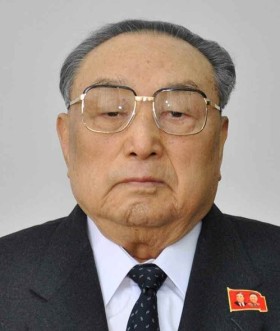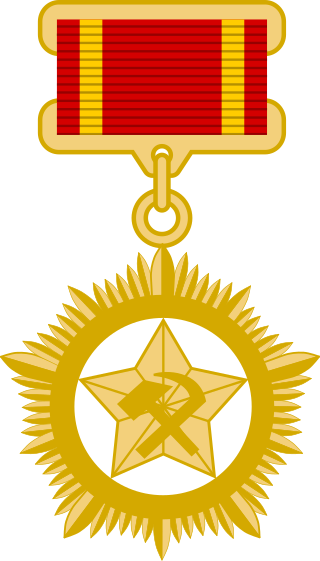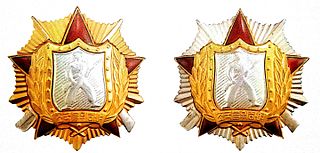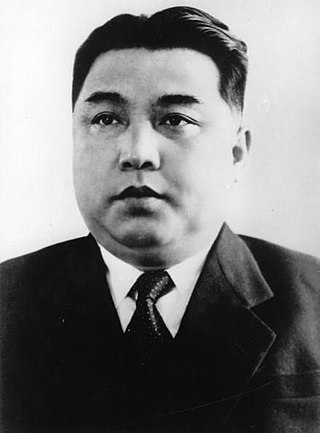
The national flag of the Democratic People's Republic of Korea, commonly known as North Korea, consists of a wide horizontal red stripe bordered above and below by a thin white stripe and a broad blue stripe. The red stripe is charged near the hoist with a five-pointed red star inside a white circle. The design of the flag is defined in the North Korean constitution and regulations regarding the use and manufacture of the flag are outlined in the country's national flag law. The North Korean government credits Kim Il Sung, the country's founder and first leader, as the designer of the flag. The flag was officially adopted on 8 September 1948, with the passing of North Korea's first constitution by the Supreme People's Assembly. The North Korean flag is banned in South Korea by the National Security Act.

The Socialist Constitution of the Democratic People's Republic of Korea is the constitution of North Korea. It was approved by the 6th Supreme People's Assembly at its first session on 27 December 1972, and has been amended and supplemented in 1998, 2009, 2012, 2013, 2016, 2019 (twice), 2023 and 2024. It replaced the country's first constitution which was approved in 1948.

The President of the State Affairs Commission of the Democratic People's Republic of Korea, alternatively styled "President of State Affairs" in official translations, is the supreme leader and head of state of North Korea. The president chairs the State Affairs Commission (SAC), which is the highest leadership institution in North Korea, and serves as the commander-in-chief of the North Korean armed forces.

Norodom Monineath Sihanouk is the Queen Mother of Cambodia. She was Queen of Cambodia from 1993 to 2004, as the wife of King Norodom Sihanouk. She is the widow of King-Father Norodom Sihanouk, whom she married in 1955 as the "secondary consort". After Sihanouk and Norleak divorced in 1968, Monineath became the official spouse of the King.
O Jin-u was a North Korean general and politician. He was a close associate of Kim Il Sung. O served under Kim in the Northeast Anti-Japanese United Army, and then as commander of Kim's bodyguard. He was a founding officer of the Korean People's Army (KPA), fought in the Korean War, and was a Vice-Chairman of the National Defence Commission from 1972 until dying in 1995. He was considered to be the most powerful person in North Korea after Kim Il Sung and Kim Jong Il, a hardliner, and a strong supporter of North Korea's nuclear program.

Jean-Louis Georgelin was a French Army general who was Chief of the Defence Staff between 4 October 2006 and 25 February 2010. From 9 June 2010 until 31 August 2016 he served as Grand Chancellor of the Légion d'honneur, the French national order.

Kim Il Sung was a North Korean politician and revolutionary. He founded the Democratic People's Republic of Korea, commonly known as North Korea, which he led as Supreme Leader from its establishment in 1948 until his death in 1994. Afterwards, he was succeeded by his son Kim Jong Il and was declared Eternal President.

Kim Yong Ju was a North Korean politician and the younger brother of Kim Il Sung, who ruled North Korea from 1948 to 1994. Under his brother's rule, Kim Yong Ju held key posts including Politburo member in the Workers' Party of Korea (WPK) during the 1960s and early 1970s, but he fell out of favour in 1974 following a power struggle with Kim Jong Il. From 1998 until his death in 2021, he held the ceremonial position of Honorary Vice President of the Presidium of the Supreme People's Assembly (SPA), North Korea's parliament.
The Republic of Senegal awards the following orders, decorations and medals.

The National Order of the Ivory Coast is the highest state order of knighthood of the Ivory Coast.

The National Order of the Lion is the highest order of Senegal.
The National Order of Benin is the highest national honour in the Republic of Benin. It is conferred on individuals that have achieved high merits in their field, and is awarded by the President of Benin. It is one of two post-colonial national medals of Benin, the other being the Medal of Honor of the Police. Recipients of this award include Aliko Dangote, President Dr. Ernest Bai Koroma, and Bunmi Makinwa.

The Ordre national du Mérite is a French order of merit with membership awarded by the President of the French Republic, founded on 3 December 1963 by President Charles de Gaulle. The reason for the order's establishment was twofold: to replace the large number of ministerial orders previously awarded by the ministries; and to create an award that can be awarded at a lower level than the Legion of Honour, which is generally reserved for French citizens. It comprises about 185,000 members; 306,000 members have been admitted or promoted in 50 years.

Upon its liberation in 1945 and subsequent foundation in 1948, North Korea adopted national symbols distinct from the national symbols of South Korea. The traditional flag of Korea, the Taegukgi, and the symbol Taeguk, were swapped for socialist symbols.

The Order of Kim Il Sung (Korean: 김일성훈장) is the highest order of North Korea, along with the Order of Kim Jong Il, and only second to one honorary title, the Hero of Labour.

Labor Hero is one of the highest titles of honor of North Korea and the highest decoration of the country overall. The award was probably scheduled for establishment in the summer of 1950, but the Korean War postponed these plans. When the war had entered a phase of stalemate along the 38th parallel, the government had time to officially launch the decoration, originally under the name Korea Hero of Labor. 16 people were decorated Labor Heroes during the war and more since then. The decoration is based on its Soviet equivalent, Hero of Socialist Labour.

The Soldier's Medal of Honour was instituted on July 1, 1950. The order is a military award of North Korea given to soldiers and guerrillas for combat bravery or leadership of troops in battle. Designed along the lines of and awarded with the criteria as the same level as the Soviet Order of the Patriotic War. North Korea granted a 50% pension to any soldier permanently disabled in an action that result in the soldier being awarded the order.

Hero of the Republic is a North Korean honorific title. It was created on 30 June 1950 as Hero of the Korean People's Republic (조선인민공화국영웅). It was the first title created in the country. Despite having been created just five days after the Korean War broke out, the connection seems incidental. 533 people were awarded Hero of the Republic during the war, and many more since then.
The Order of Ivory Merit is the second highest honorary order of the Ivory Coast created in 1970, and is intended to reward distinguished merits acquired in a public, civil, military or private function.

Kim Il Sung was the founder and first leader of North Korea. According to North Korean sources, the country awarded him "the title of Hero of the DPRK three times, the title of Labour Hero of the DPRK, 26 orders and 3 medals". In addition, foreign countries and organizations conferred upon him 74 orders and 152 medals.





















